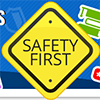How will you pay for college, what career should you pursue, and how can you access the best college resources? Questions like these arise before high school graduation and again when applying to graduate programs. Navigating the college application process might feel overwhelming at times, so we offer resources to help. Find support on topics including finding financial aid resources, choosing a major, and safely enjoying campus life.
Academic Support
Gaining college admittance and then succeeding during studies takes effort and planning. These articles guide students toward meeting these goals. Learn to avoid pitfalls such as plagiarism. Explore whether you should apply to community college or a private university.

How College Transfers Work
Students might begin their studies at one institution and finish at another. This guide outlines the transfer process, typical transfer requirements, and scholarships reserved exclusively for transfer students. With this knowledge, learners easily transfer from a community college to a private university.

Plagiarism Prevention and Awareness
Copying someone else's work brings short- and long-term consequences. This article discusses plagiarism's implications and producing original work. Follow the link to read about various plagiarism types, including verbatim and mosaic plagiarism, uncited or inadequate paraphrasing, and uncited quotations.

How to Get Into College: Ultimate Guide to Admissions
Colleges accept a limited number of students each year. This article helps students position themselves as competitive applicants. Learn about the application timeline, which schools to apply to, and expert advice on college acceptance. The guide highlights the importance of applying to safe schools and reach schools.
More Guides
Featured Online Degree Programs
Financial Aid
Pursuing U.S. higher education often requires a financial investment. Learners can lower the costs in multiple ways with college resources. Read these articles to learn about actual college costs, how to take out loans wisely, and how financial aid types differ.

How Much Does Online College Cost?
Virtual learning offers flexibility and often costs less than in-person courses. This link breaks down online college costs and highlights the typical savings on credits and on-campus housing and dining. The article lists standard fees to budget for when attending college virtually.

Guide to Financial Aid Scholarships
Students use financial aid resources to cover tuition, living expenses, and educational supplies. Discover how to lower the average tuition cost with grants, loans, pell grants, and scholarships. The guide outlines the differences between subsidized and unsubsidized loans, private loans, work-study opportunities, scholarships, and grants.

Student Loans the Right Way
For many individuals, student loans constitute their first type of debt. Read this financial aid resource to learn what you should know before taking out loans. The page covers common loan types and how to apply for them. Readers learn about the FAFSA application process and when to expect funds.
More Guides
Scholarships
Unlike other forms of financial aid, scholarships do not require repayment. Universities, foundations, and corporations all offer students financial assistance. Use these links to discover scholarships reserved for specific types of learners.

Prestige College Scholarships
This type of scholarship pays for college and bestows a new accolade for your resume. Read the guide to discover the answers to the frequently asked questions surrounding this topic. Find a list of common prestige scholarships, as well.

College Scholarships for Black Students
Read this article for tips on applying to scholarships for Black students. We list common application components and offer a Black student scholarship directory. The guide names organizations offering support for these students.

Top Minority College Scholarships
Minority students can apply for scholarships that aid underrepresented learners. This page outlines awards for students with unique heritage. It describes the application process step-by-step. Learn about other forms of aid like grants, privately funded scholarships, and industry-specific scholarships.
More Guides
Life on Campus
After gaining admittance, learners should focus on succeeding in their studies and enjoying their current life chapter. Check out these college resources on maintaining a college budget and living on campus.

Budgeting for College Students
Moving away from home while starting college is a huge step in a student's life, and making the right housing decision can set the stage for a successful college education. On-campus, off-campus, roommates or living with family – which is right for you? Find info on college housing options that can help lead you to make the best choice.

The College Housing Survival Guide
Housing comprises a large portion of a college budget. Read this resource to explore the pros and cons of living on- or off-campus. The article discusses various types of student housing, such as Greek houses or residence halls. It offers advice on choosing roommates, getting along with roommates, and avoiding rental scams.

College Has Its Perks
Attending college comes with other short-term benefits, namely, college discounts and freebies. Discover brands offering lower rates for students, common free campus resources, and professional organizations providing student member discounts.
More Guides
Minority Students
Most institutions seek a diverse student body. Underrepresented learners may qualify for additional scholarships and resources. These links discuss campuses that provide extra support for minority students.

College Student Guide to Minority Serving Institutions
This article offers an overview of minority-serving institutions, including what constitutes one and the various types. It spotlights noteworthy institutions for students with Native American, Hispanic, and Black heritage. Follow the link to see the five states with the most minority-serving institutions.

Doctoral Programs for Women of Color
Read this article to learn how minority women find academic programs that facilitate success. The resource provides an overview of how many women of color currently earn doctorates and common issues they face. It includes a section with advice directly from women of color in doctoral programs.

Multiculturalism and Diversity on the College Campus
Finding an inclusive campus takes research, and this page can help. It offers tips for identifying which colleges take actionable steps towards multiculturalism and equality. The article provides information on how to use community resources working toward similar goals.
More Guides
Student Special Interest Groups
College already challenges students academically, so other life challenges may create an extra burden for certain students. Check out this information on student special interest groups.

College Success for Women in STEM
In recent years, many organizations formed to increase the number of women working in STEM fields. This guide discusses STEM scholarships for women, professional groups for STEM women, and college outreach programs. It includes a section on how parents can encourage their daughters to pursue a career in this lucrative sector.

Homeless Youth and Higher Education
Students experiencing homelessness can seek resources to meet housing needs and access food and living essentials. This article discusses various tools for students struggling with finances or access to healthcare. Here, readers learn tips for filling out the FAFSA and receiving waivers for college fees.

LGBTQ+ College Student Resources
Discover which colleges support LGBTQ+ college students with resources like student centers. This article discusses LGBTQ+ organizations and the importance of providing these students with resources. Readers learn more from a coordinator of a school resource center.
More Guides
Students with Disabilities
Disabilities should not prevent students from achieving their academic goals. Whether a student possesses a hearing, visual, physical, or mental disability, they can find help.

Career Guide for Students with Disabilities
This article informs students and job applicants of their rights surrounding the Americans with Disabilities Act. It goes over reasonable accommodations and requesting them, selecting a career with a disability in mind, and internship resources. Read through a Q&A with the president of the Global Disability Inclusion organization.

College Resources for Students With Disabilities
Many colleges tailor their campus buildings and courses to meet the needs of students with disabilities. This article outlines supportive assistive technology for multiple types of disorders including autism, attention-deficit hyperactivity disorder, and physical and hearing impairments. The report concludes by providing tips on transitioning from high school to college with a disability.

College Scholarships and Financial Aid for Students with Disabilities
Students with disabilities qualify for unique scholarships. The linked resource outlines how many of these students attend college and highlights scholarships for eight main types of disabilities. Most of these awards require essays, documentation of the disability, and recommendation letters.
More Guides
College Health and Safety
To learn adequately, individuals must also meet their own basic needs. For this reason, learners should take steps to protect their well-being during their studies. Read these articles on maintaining physical and mental health during college amid common issues on college campuses.

Mental Health in College
Completing fast-paced and intellectually challenging courses causes stress and may trigger mental health issues. Luckily, learners can take preventative steps and many campuses provide free resources to help do so. Check out this article to learn about the state of mental illness on college campuses, common types of mental health disorders, and academic accommodations for students living with these issues.

Student Guide to Health Insurance Plans
Discover health plans for college students, including catastrophic, short-term, and Healthcare Marketplace insurance. This guide provides tips for saving on medical expenses. Tips include comparing prescription prices at pharmacies and remaining on a parent's insurance plan until age 26.

Women's Health in College
Read this article to learn about the resources and support that campuses provide female students. These resources include STD/STI screenings, pregnancy support, and nutrition services. This page highlights two female health centers on college campuses and touches on accommodations required by the Americans with Disabilities Act.
More Guides
News
With federal and state legislation changing constantly and industries adapting to the new normal, education requirements fluctuate regularly. For example, COVID-19 influenced many programs to move online and sparked a student loan freeze. The pandemic still makes headlines daily and poses unpredictable education implications. To stay ahead of the information curve, we suggest checking out our news center. We offer bipartisan and accurate news on the state of education and college resources.
Keep up with the latest
Never miss a detail on the news, trends, and policies that could directly impact your educational path.
Best Master's in Data Analytics Programs: What You Need to Know
Top Online MBAs in Business Analytics
Explore the top online MBAs in business analytics, including tuition costs, curricular offerings, and more with this student research resource.
Scholarships and Financial Aid in Texas
Financial aid makes college a reality for many students. Learn about the top scholarships in Texas and how you can earn one.
AffordableCollegesOnline.org is an advertising-supported site. Featured or trusted partner programs and all school search, finder, or match results are for schools that compensate us. This compensation does not influence our school rankings, resource guides, or other editorially-independent information published on this site.
Do this for you
Explore your possibilities- find schools with programs you’re interested in and clear a path for your future.